| Srl | Item |
| 1 |
ID:
047335
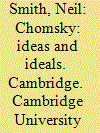

|
|
|
|
|
| Publication |
Cambridge, Cambridge University Press, 1999.
|
| Description |
ix, 268p.
|
| Standard Number |
0521475408
|
|
|
|
|
|
|
|
|
|
|
|
Copies: C:1/I:0,R:0,Q:0
Circulation
| Accession# | Call# | Current Location | Status | Policy | Location |
| 044839 | 410.92/SMI 044839 | Main | On Shelf | General | |
|
|
|
|
| 2 |
ID:
124464
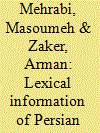

|
|
|
|
|
| Publication |
2013.
|
| Summary/Abstract |
This article investigates the nature of lexical information in the lexical entries of Persian transitive verbs. In the first experiment transitive verbs were categorized into five groups. What differentiates them is the number of argumental structural and subcategorization frame options of each verb. The question is: which one is more fundamental in sentence processing? In the second test the question is whether the number of argument(s) and complement(s) in each option determines processing time. Twenty normal native speakers of Farsi participated in these tests, divided into two groups. Cross-modal lexical decision method was used here. Using the DMDX software program the tests were performed and using t-tests the data were analyzed. The results of the first test show that both the argumental structure and subcategorization frame possibilities of the verb can affect sentence processing time. Also the important role of the number of the complement(s) needed for a specific verb has been indicated by the second test results. Overall results show that the verb type of a sentence and sentence syntactic complexity determine the processing time. This has some implications for teaching Farsi to foreign language learners for whom knowing more verbs leads to making more grammatical sentences.
|
|
|
|
|
|
|
|
|
|
|
|
|
|
|
|
| 3 |
ID:
001094
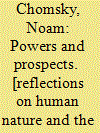

|
|
|
|
|
| Publication |
DelhI, Madhyam Books, 1996.
|
| Description |
x,244p.
|
| Standard Number |
8186816011
|
|
|
|
|
|
|
|
|
|
|
|
Copies: C:1/I:0,R:0,Q:0
Circulation
| Accession# | Call# | Current Location | Status | Policy | Location |
| 040591 | 100/CHO 040591 | Main | On Shelf | General | |
|
|
|
|
| 4 |
ID:
099701
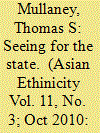

|
|
|
|
|
| Publication |
2010.
|
| Summary/Abstract |
This article proposes a new understanding of the Ethnic Classification project (minzu shibie) undertaken in China's southwesternmost province of Yunnan in 1954 - a project in which social scientists and Communist Party cadres set out to determine which of the dozens, if not hundreds, of minority communities in the province would be officially recognized by the state. Specifically, this article argues that ethnologists and linguists played a far greater role in the Classification and early Chinese Communist governmentality than is typically assumed. The Chinese Communists did not teach themselves how to 'see like a state,' to use James Scott's formulation, at least not when it came to the fundamentally important problem of ethnic categorization. To the contrary, the history of the Classification project is one of an inexperienced Chinese state that was able to orient itself only by observing the world through the eyes of its social scientific advisors. The 'mentality' within early Chinese Communist Party (CCP) 'governmentality' was, in the case of the 1954 Ethnic Classification, in large part the mentality of the comparative social sciences.
|
|
|
|
|
|
|
|
|
|
|
|
|
|
|
|
| 5 |
ID:
123320
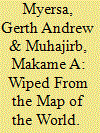

|
|
|
|
|
| Publication |
2013.
|
| Summary/Abstract |
This essay uses the case of Zanzibar in its complicated relationship with the United Republic of Tanzania (of which it is a part) as a lens on debates in political geography on empirical and conceptual approaches to critical geopolitics. We test the veracity of a multi-faceted critical geopolitics in the contemporary public contestation of Zanzibar's place in the United Republic from 2008-2012. We analyze Tanzanian media, the speech acts of Tanzanian leaders, and the key events and processes related to what is termed the 'Zanzibar problem' during the selected years, to make two points about a critical geopolitics approach: to strengthen critical geopolitics by broadening the analysis of language to engage political acts and languages beyond the Global North; and taking 'subaltern geopolitics' more seriously via engagement with critical geopolitical voices on discourses, events and processes from the Global South.
|
|
|
|
|
|
|
|
|
|
|
|
|
|
|
|
| 6 |
ID:
123718
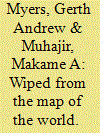

|
|
|
|
|
| Publication |
2013.
|
| Summary/Abstract |
This essay uses the case of Zanzibar in its complicated relationship with the United Republic of Tanzania (of which it is a part) as a lens on debates in political geography on empirical and conceptual approaches to critical geopolitics. We test the veracity of a multi-faceted critical geopolitics in the contemporary public contestation of Zanzibar's place in the United Republic from 2008-2012. We analyze Tanzanian media, the speech acts of Tanzanian leaders, and the key events and processes related to what is termed the 'Zanzibar problem' during the selected years, to make two points about a critical geopolitics approach: to strengthen critical geopolitics by broadening the analysis of language to engage political acts and languages beyond the Global North; and taking 'subaltern geopolitics' more seriously via engagement with critical geopolitical voices on discourses, events and processes from the Global South.
|
|
|
|
|
|
|
|
|
|
|
|
|
|
|
|